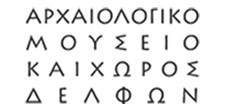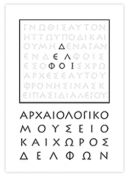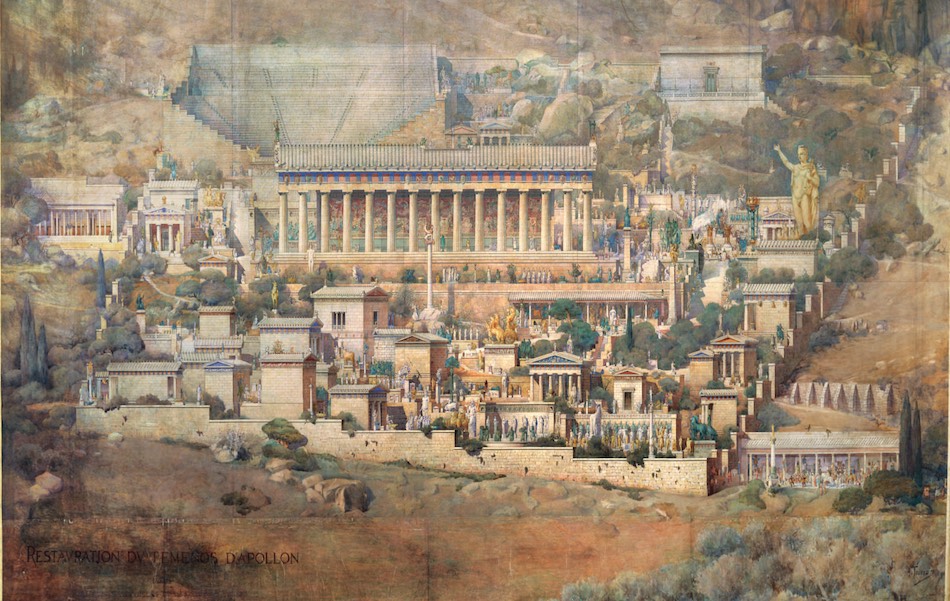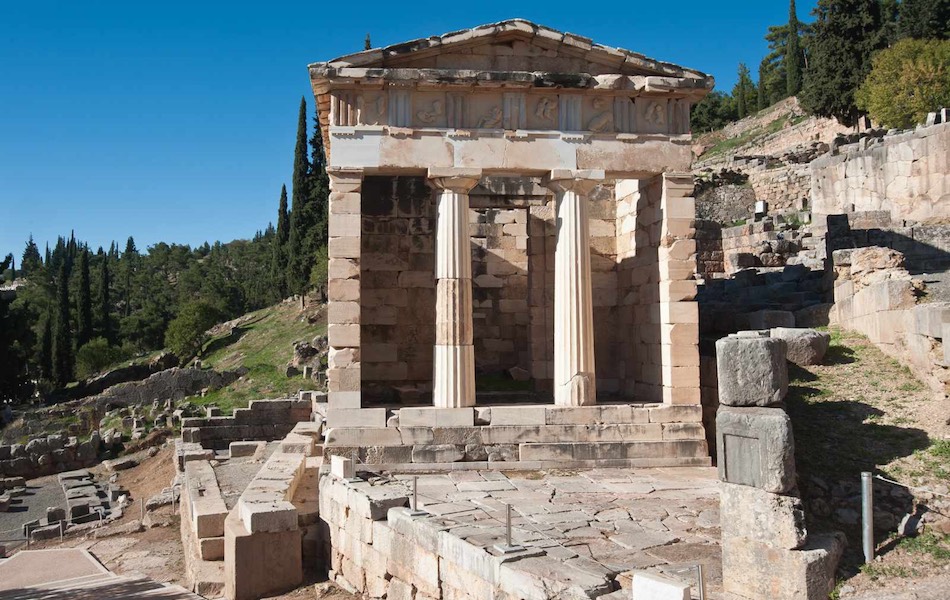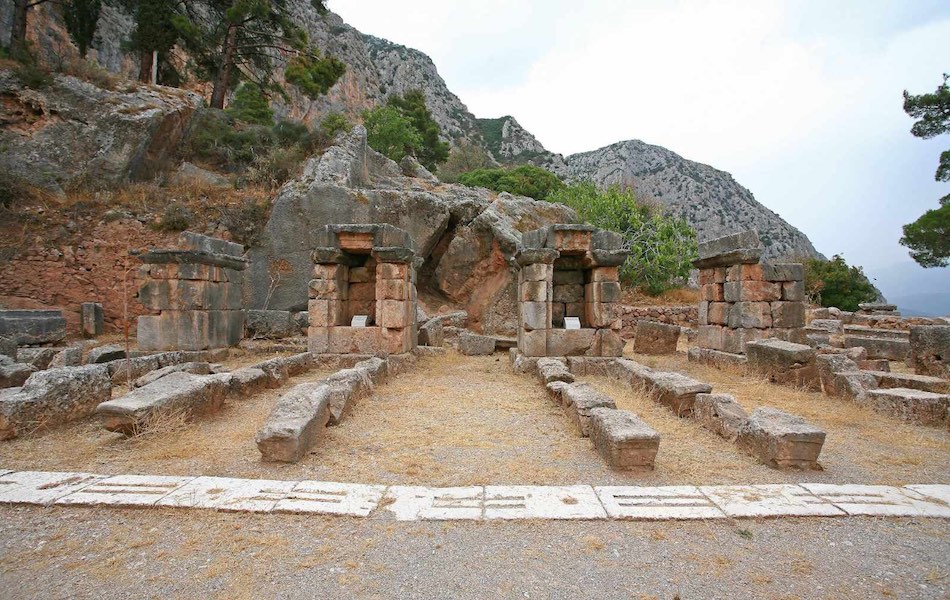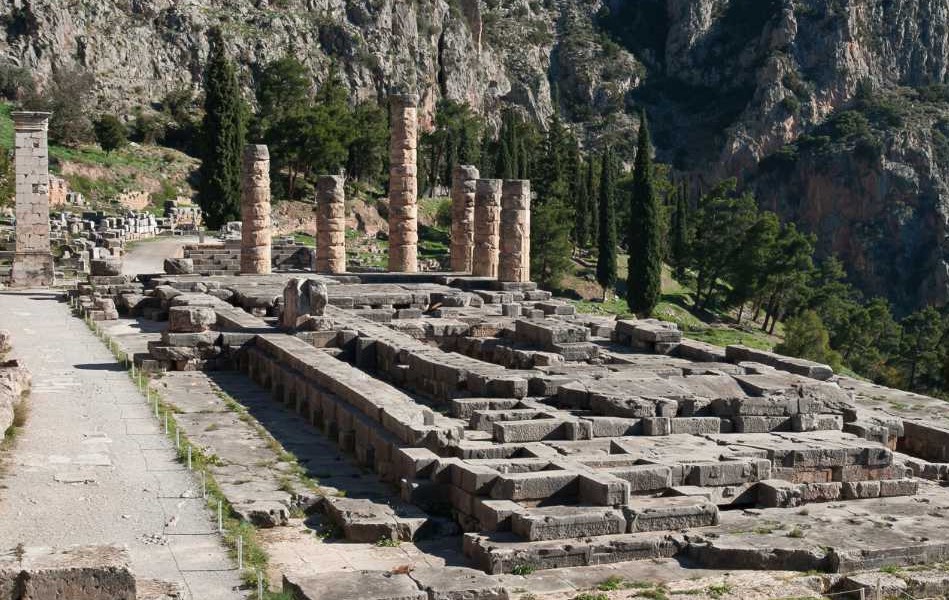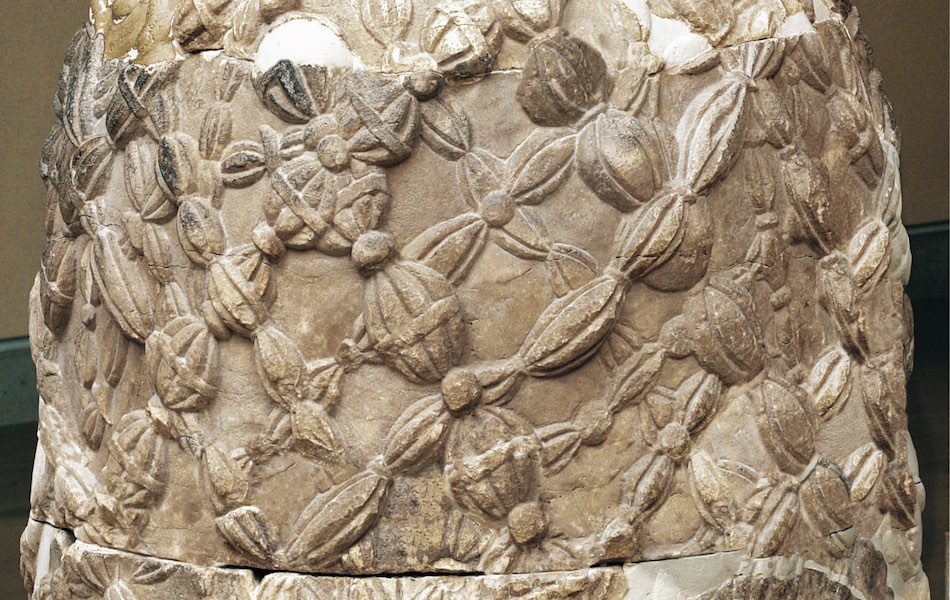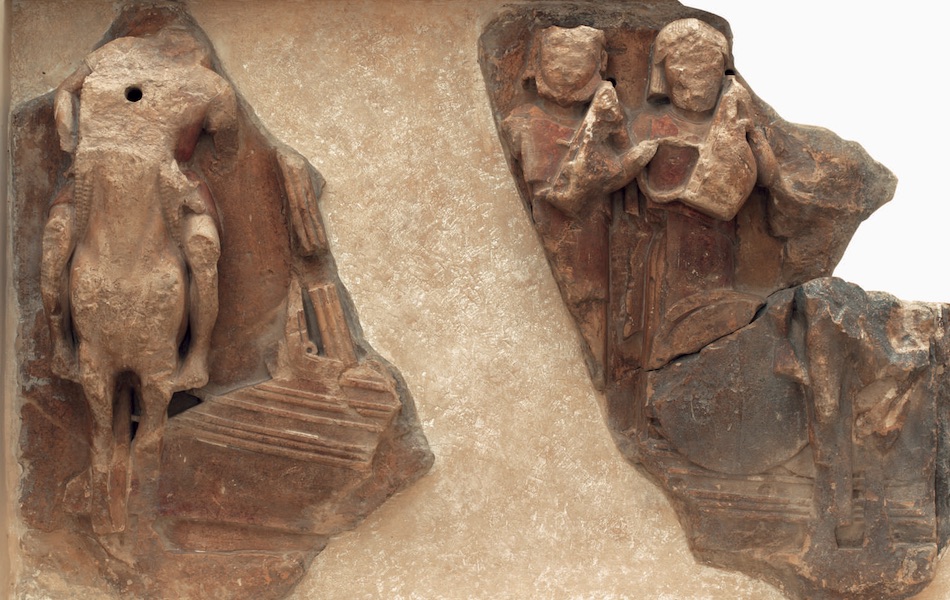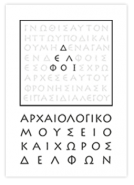This website uses cookies so that we can provide you with the best user experience possible. Cookie information is stored in your browser and performs functions such as recognising you when you return to our website and helping our team to understand which sections of the website you find most interesting and useful.
Mythological versions of the foundation of the Oracle
Ancient authors relate the following variations of the foundation myth of the sanctuary and oracle of Delphi:
Diodorus’ “scientific” version
Diodorus of Sicily (XVI, 26, 1-6) speaks of a shepherd who, while grazing his flock in the area, noticed fumes being emitted from a gap next to the Phaedriades. In fact, he observed that the animals, upon approaching this gap, began to behave in a very strange way. As he approached the cavity he began to utter incomprehensible words and fell into a trance. Subsequently, it became evident that these words predicted the future. From then onwards, the Pythia, a priestess, settled there and founded the Oracle.
The Homeric version
According to the Homeric “Hymn to Apollo”, the god had a hard time discovering a suitable place to establish his oracle. He started from Mt. Olympus and after crossing Lektos and the areas where the Aenians and the Perrhaevians used to live, he arrived at Iolkos. From there, he crossed to Euboea, to the cape of Kinaio, stopped at the Lelantine plain and from Euripus he returned again to Mainland Greece. Leaving behind Mt. Messapio, he passed through Mykalessos and Teumessos and then reached Thebes. Not even Thebes satisfied him, so he headed towards Onchestos, crossed the Kephissus river and after passing Okaleia and Aliartos, he reached the waters of the Telphoussian spring at the feet of the homonymous mountain. The nymph Telphousa persuaded him to move on towards Krisa.
Hence, leaving Panopeus behind, the town of the presumptuous Phlegyans in Kopais, Apollo arrived in Krisa to establish the Oracle on the slopes of Mt. Parnassus. However, he realized that he had been deceived by the nymph Telphoussa who had directed him to an uninhabited rocky location. For this reason, he returned to Telphoussa spring, buried the water beneath a pile of stones, and then built his own altar right next to it. After that, using an arrow, he killed a a female dragon who fed on humans and animals and, as she lay dying, Apollo shouted at her: “above the earth and under the blaze of the sun rot, not to hurt the people who will come to offer me sacrifices and to request from me an oracle”.
According to the Hymn, the first priests of the Oracle were Cretans who were saved by the god who had taken the shape of a dolphin and carried them on his back safely to the shore. When they asked the god how they would manage to live in this place he god replied that they would live off the offerings of the pious flock. Thus, the Cretans instigated the worship of Apollo Delphinios and the place was named Delphi.
Goddess Gaia and the oracle
In the Eumenides tragedy (f. 1-23) Aeschylus presents a different version. The first diviner at Delphi was goddess Gaia who was succeeded by her daughter Themis. Then came the Titaness Phoebe, also daughter of Gaia, and afterwards came Apollo, named Phoebus obviously from Phoebe. In the myth of Aeschylus, Apollo came from Delos and settled at Delphi without having to kill the Python. At the same time it is related that Athena Pronaia also shared the art of divination, as she had been taught how to predict the future by the Thriae, the winged nymphs of Parnassus, who used pebbles as an oracular means. Apollo, however, complained to Zeus, who defended his son. Then Athena abandoned the art of divination by throwing the pebbles into a field which since then has been named the Thriassio Field.
According to Pausanias (Description of Greece, X. 5-6), who delivers to us different versions of the myth, the first god who seems to take ownership of the Oracle was Gaia, who had assigned Daphne, a mountain nymph, to provide the oracles.
Based on another tradition which Pausanias found in the epos of Eumolpus Mousaios, the Oracle was shared by Gaia and Poseidon. Gaia was giving the oracles herself, while Poseidon used Pyrkon as his voice to give responses. Subsequently, Gaia gave a share of the Oracle to Themis who in turn gave it to Apollo as a gift.
The version of the infant Apollo killing the Python
In Iphigenia Among the Taurians (f. 1234-1282) Euripides says that Apollo, while still an infant, arrived at Parnassus from Delos with his mother Leto and he took over the Oracle, after having killed the massive beast (dragon) that was guarding it. Gaia, however, was enraged because of the way her daughter Themis was violently expelled from the Oracle and began to send prophetic dreams to the people in order to weaken the power of the god Apollo. The problem was finally resolved with the intervention of Zeus, who took the side of Apollo, giving him power over this site.
The association with the Hyperboreans
Finally, Pausanias mentions a hymn composed by Boeo, according to which the founders of the Temple were the Hyperboreans. Three of them are mentioned by name, namely Pagasos, Agyeus and Olenas, the latter being the first diviner.
The version of the tripod
Another myth refers to Themis as being the master of the Oracle and Python as a monster that was guarding it, and at the same time, provoking various disasters in the area. It blurred the waters of the springs and streams, abducted the flocks and villagers, destroyed the crops in the fertile plain of Krisa and frightened the nymphs. After killing Python, Apollo took the Oracle from Themis and devoted a tripod to the sanctuary. The tripod, thereafter, became one of the symbols of the god and on top of this sat Pythia in order to give her oracles.
The representation on the eastern pediment of the Siphnian Treasury narrates another myth. According to this, Hercules came to seek a prophecy from the Oracle, but when the priests refused on the grounds that he had not been atoned for the murder of Iphitos, he took the delphic tripod and was ready to go and establish his own oracle. Apollo tried to prevent him, they clashed and then Zeus intervened. He separated them with a thunderbolt and convinced Hercules to return the tripod and Apollo to give him the oracle (Pausanias, Fokika 13 7, which refers to an offering by the Phoceans).
The name
In the Iliad (B 519), Odyssey (θ 80) and the Hymn to Apollo Delphi is called Peitho. Although the Hymn does not refer to the place named Delphi, it refers to the myth of Apollo and the dolphin: The god commands the Cretans to establish in his honour an altar on the beach of Krisa and to worship him as Delphinios. Perhaps we have here the first attempt to interpret the place name of the Oracle (delfis, dolphin – Delphi). The name Delphi had been introduced since the 7th century BC at the latest. But the effort to interpret the etymology of the place name continues. Thus, in Alexandrian times the dragoness is called Delfyne and Delfynis (Callimachus, fr. 88 and Apollonius Rhodius 2, 706), but also Python (Apollodorus A 4.1: dragon, A 6.3 Delfynis). Pausanias (Fokika 6) devotes a whole chapter to different mythological explanations concerning the origin of the name Peitho as well as the name Delphi. Other etymologies are: for Peitho from the verb pythomai (= rot, by the rotted corpse of the snake that was killed by Apollo), or pynthanomai (= ask to know, by associating the name of the place with the work of the Oracle). For Delphi the following etymologies have been proposed:
• Delphos, son of Apollo by Celaino, the daughter of Hyamos, or by Thyia or even by Melaina, the daughter of Kephissus who was either the first king of Delphi or the leader of the Cretan settlers who arrived in Phokis and founded Delphi there.
• Delphys which means uterus and is justified either by the geographical form of that area or by the fact that Gaia was worshipped there. The inhabitants were called Delphoi.
The art of divination: Sibylla and Pythia
The diviners
Sibylla is included in the traditional framework for the existence of a “primitive” oracle, presented as the diviner before the time of Apollo. At the archaeological site of Delphi there is a rock on which Sibylla sat and chanted the oracles, and unlike Pythia, offered them without them being requested. Written sources indicate Herophile as the oldest Sibyl (Pausanias, Fokika 12), and Sibylla, like Pythia, was the collective name for the diviners before the time of Apollo.
The name Pythia was rendered to each High Priestess of the god Apollo, and was originally a young virgin. Consequently, and after a Pythia was abducted by a Thessalian aristocrat, it was decided, at least according to the written sources, that Pythia be middle-aged. She would be of Delphi family descent without social class background playing a role, and the position would be for life.
The ritual of pronouncing the oracles
The ancient sources are very chary regarding the oracle-giving procedure, apparently because many parts of it remained strictly forbidden to the public. We know, however, that Pythia pronounced its oracles in the adyton of the temple of Apollo. It is considered that at that spot emanated toxic gas from a gap on the ground. Initially, Pythia pronounced oracles only once a year, on the seventh day of the month Vysios, then, however, it became customary to give oracles on the seventh day of each month, apart from the three winter months.
On the oracular day Pythia and the two priests, cleansed themselves in a ritual manner in the fountain Castalia and, after paying the “pelanos”, a kind of tribute to the god, they sacrificed a young animal after throwing on it water from Castalia. If the animal started trembling, this was a sign that the god was present and they went on with the procedure. Pythia burned laurel leaves and descended to the adyton, whereas the priests and the five “hosioi” remained in a room right above it, so that they could hear the oracles pronounced by her. It is thought that Pythia fell in a sort of trance, by inhaling the gas emanated from the ground, by smelling laurel leaves and drinking water coming from the fountain Cassotis, and then pronounced oracles in verse and almost always with a double meaning. Therefore, the oracles were always interpreted by the priests and hosioi and was given to the one who asked for it in writing. The archaeological research, however, has not managed to offer material proof for this procedure, as under the adyton of Apollo no gap or opening of the ground has been discovered, from where toxic gas could emanate.
MUSEUM OF DELPHI
